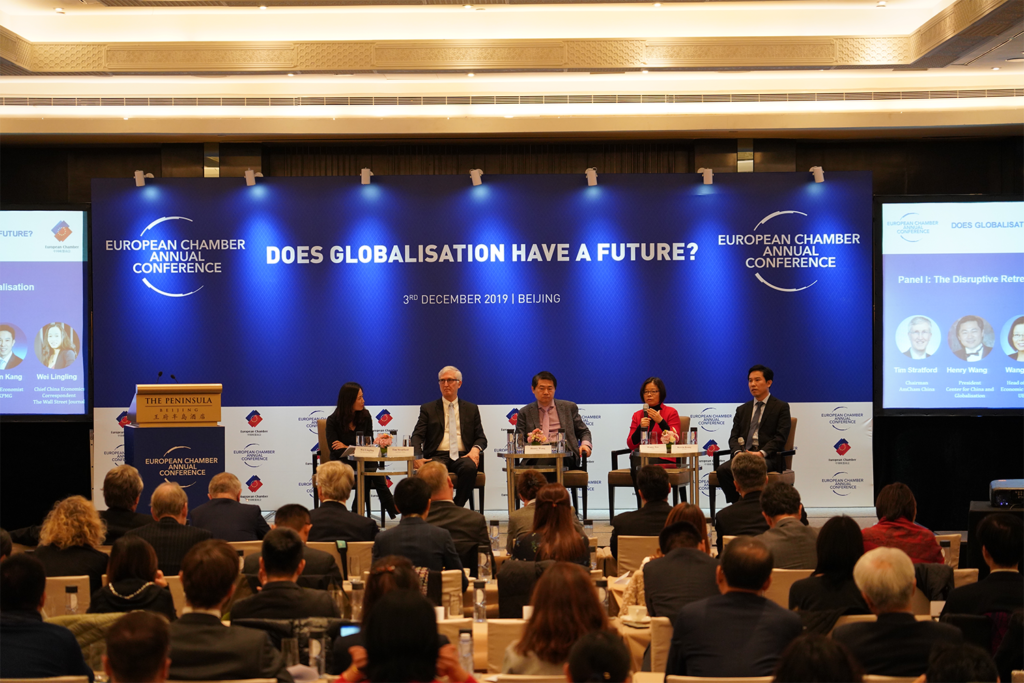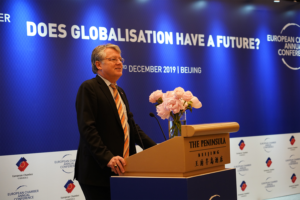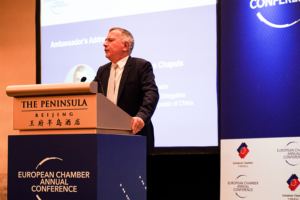
The European Chamber Annual Conference 2019
The European Chamber’s annual conference took place in Beijing on 3rd December 2019, just a short walk away from the Forbidden City and Tian’anmen Square; the heart of the Chinese capital. It was held in one of the first ‘luxury’ establishments to set up in Beijing, and provided a base for European brands like Louis Vuitton, Chanel and Hermès three decades ago as they took the plunge into the Chinese market. This history made the location very fitting for the Chamber’s 2019 conference themed ‘Does Globalisation Have a Future?’

gives opening speech
European Chamber President Jörg Wuttke got the event underway with a speech to the gathered business, academic and diplomatic leaders and experts. President Wuttke outlined some of the reasons behind the turn against transnational multilateralism: not everybody was seeing the benefits of globalisation; Francis Fukuyama’s ‘vetocracy’ being played out – where no single entity can acquire enough power to make decisions and take effective charge; and a meltdown in trust in the elite.

addesses the 2019 Annual Conference
The European Union (EU) Ambassador to China, HE Nicolas Chapuis, also addressed the event. He started by describing a photograph he had seen a short time previously of the new European Union leaders: European Commission President Ursula von der Leyen, European Council President Charles Michel, European Parliament President David Sassoli and European Central Bank President Christine Lagarde. The ambassador said while this line-up indicated continuity, people should also expect some changes from the EU, as it has been announced that this executive will be more geopolitical, more outwards-looking. And China will be a major focus for it. Ambassador Chapuis also said that climate change, digitalisation of societies and migration will also be key areas for the new Commission, all of which will need cooperation and participation by China to have any meaningful impact on the outcomes.
The keynote speech was delivered by Long Yongtu, a former associate minister of China’s Ministry of Foreign Trade and Economic Cooperation and a former secretary general at the Boao Forum for Asia. Mr Long was also the chief negotiator for China during the General Agreement on Tariffs and Trade (GATT) and World Trade Organization (WTO) negotiations. In his speech, Mr Long said there are three major elements in globalisation:
- Driving force: such as the force of science and tech, market forces, administration force of government;
- Realisation force: those who make globalisation possible; and
- Outcome: there are many outcomes, e.g. the creation of many jobs, fast economic growth, but most important is the global network of production and supply chains.
Mr Long said many believed multinational companies (MNCs) were the realisation force because of their huge impact on trade and economy. For this reason, for many years, a key element of China’s foreign policies has been to attract foreign MNCs. However, because of the internet, many small and medium-sized enterprises (SMEs) are also joining the globalisation process, including in developing countries.
Mr Long wound up by saying that while he believes globalisation had a future—particularly due to the fluidness of developments in science and technology—it is essential for governments to ensure that the benefits of globalisation are more equally distributed.
Panel discussions
The first panel of the conference discussed the disruptive retreat of globalisation, including the impact of the US-China trade war on global sentiment. Panellists looked at the reasons behind the breakdown in trust between Washington and Beijing, and how the situation could be improved. There was a general consensus that all sides have benefitted from China’s participation in the global economy; China saw economic growth and an improvement in the lifestyles of its citizens, while other countries benefitted from the cheap goods produced by China and the boost the opening of the Chinese market gave to the global economy. Panellists also discussed the phenomenon of 和而不同 – the essential differences between the two economic systems, which need to be acknowledged and recognised before any trade disputes can be satisfactorily dealt with.
The second panel covered a wide range of issues related to China’s Belt and Road Initiative (BRI) and the EU’s Connectivity Plan. Representing a wide range of industries, panellists discussed their degree of participation in the BRI and the often limited role they are allowed to play in BRI-related projects. Panellists also covered the ongoing and potential impacts of the BRI on global markets, supply chains and competition, as well as the ensuing opportunities and challenges for companies. Their focus then shifted to the EU and the need for the bloc’s Connectivity Plan to be realised in a timely manner.
During the third panel discussion, which looked at cooperation and competition between Europe and China, panellists talked about the activities of Chinese companies in European procurement bids as well as cooperation opportunities in fields like the finance sector and climate policies. Additionally, the strengths and weaknesses of China in the global economy were addressed. Strengths mentioned included China’s sheer size, the still growing economy and the country’s ability to immediately mobilise necessary resources to develop one specific area so that competing against it would become almost impossible. However, a major weakness is China’s inexperience in dealing with risk and crises.
All chapters of the European Chamber organise events throughout the year, with upcoming events listed on our website. To keep up-to-date on what’s scheduled, follow us on social media or download our Events app.


Recent Comments